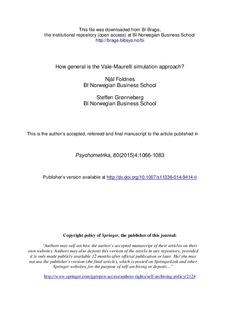| dc.contributor.author | Foldnes, Njål | |
| dc.contributor.author | Grønneberg, Steffen | |
| dc.date.accessioned | 2016-01-22T08:37:20Z | |
| dc.date.available | 2016-01-22T08:37:20Z | |
| dc.date.issued | 2015 | |
| dc.identifier.citation | Psychometrika, 80(2015)4:1066-1083 | nb_NO |
| dc.identifier.issn | 0033-3123 | |
| dc.identifier.issn | 1860-0980 | |
| dc.identifier.uri | http://hdl.handle.net/11250/2374516 | |
| dc.description | This is the authors' accepted and refereed manuscript to the article | nb_NO |
| dc.description.abstract | The Vale-Maurelli (VM) approach to generating non-normal mul-
tivariate data involves the use of Fleishman polynomials applied to an underly-
ing Gaussian random vector. This method has been extensively used in Monte
Carlo studies during the last three decades to investigate the nite-sample per-
formance of estimators under non-Gaussian conditions. The validity of con-
clusions drawn from these studies clearly depends on the range of distributions
obtainable with the VM method. We deduce the distribution and the copula
for a vector generated by a generalized VM transformation, and show that it
is fundamentally linked to the underlying Gaussian distribution and copula.
In the process we derive the distribution of the Fleishman polynomial in full
generality. While data generated with the VM approach appears to be highly
non-normal, its truly multivariate properties are close to the Gaussian case.
A Monte Carlo study illustrates that generating data with a di erent copula
than that implied by the VM approach severely weakens the performance of
normal-theory based ML estimates.The Vale-Maurelli (VM) approach to generating non-normal mul-
tivariate data involves the use of Fleishman polynomials applied to an underly-
ing Gaussian random vector. This method has been extensively used in Monte
Carlo studies during the last three decades to investigate the nite-sample per-
formance of estimators under non-Gaussian conditions. The validity of con-
clusions drawn from these studies clearly depends on the range of distributions
obtainable with the VM method. We deduce the distribution and the copula
for a vector generated by a generalized VM transformation, and show that it
is fundamentally linked to the underlying Gaussian distribution and copula.
In the process we derive the distribution of the Fleishman polynomial in full
generality. While data generated with the VM approach appears to be highly
non-normal, its truly multivariate properties are close to the Gaussian case.
A Monte Carlo study illustrates that generating data with a di erent copula
than that implied by the VM approach severely weakens the performance of
normal-theory based ML estimates. | nb_NO |
| dc.language.iso | eng | nb_NO |
| dc.publisher | Springer | nb_NO |
| dc.title | How general is the Vale-Maurelli simulation approach? | nb_NO |
| dc.type | Journal article | nb_NO |
| dc.type | Peer reviewed | nb_NO |
| dc.source.journal | Psychometrika | nb_NO |
| dc.identifier.doi | 10.1007/s11336-014-9414-0 | |
| dc.description.localcode | 2, Forfatterversjon | nb_NO |
